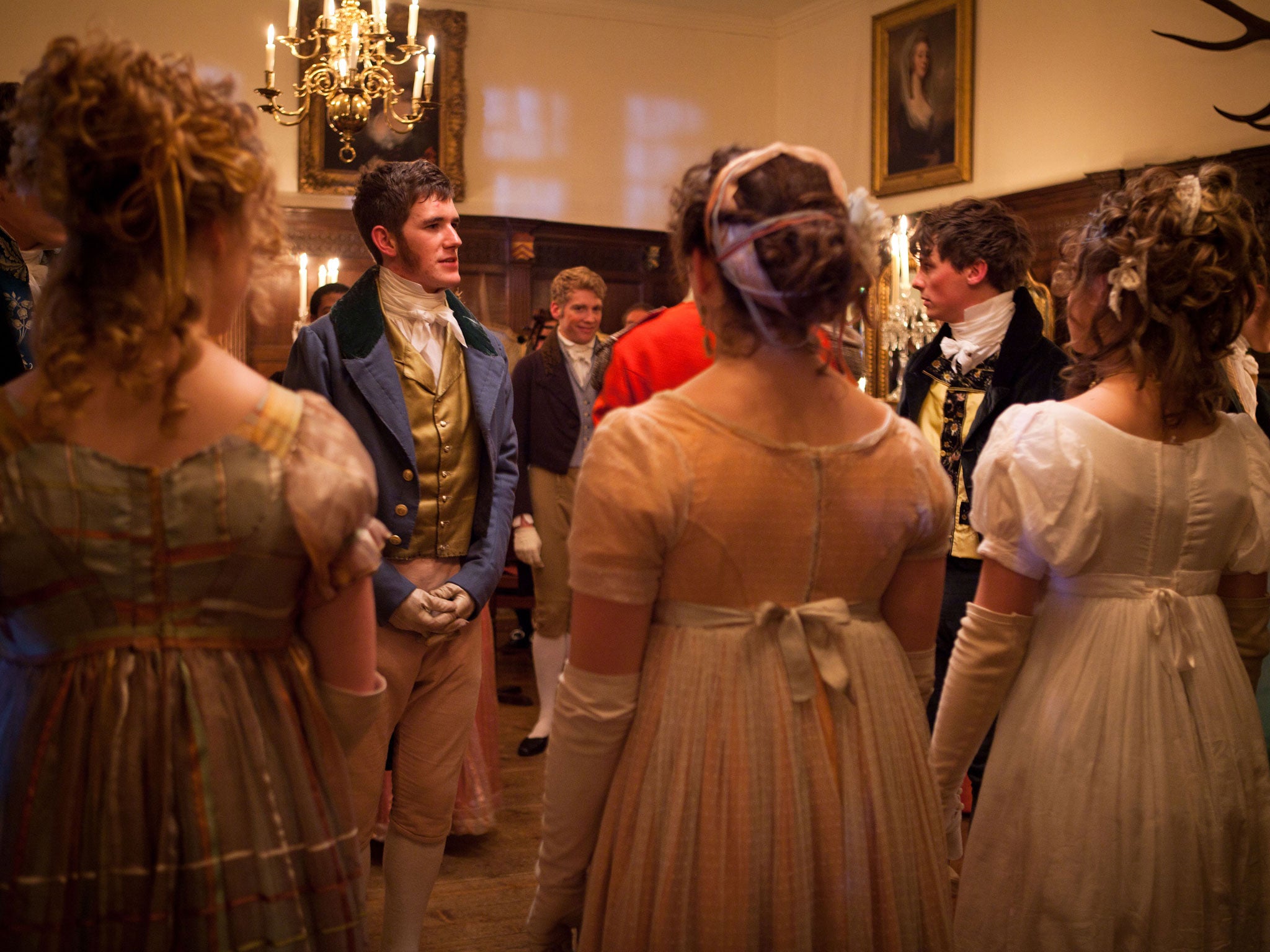TV review: Pride and Prejudice, Having a Ball - Miss Austen, shall we enjoy rapid motion?
It takes more than low-cut gowns and Darcy's skinny breeches to trigger a sexual free-for-all

Your support helps us to tell the story
From reproductive rights to climate change to Big Tech, The Independent is on the ground when the story is developing. Whether it's investigating the financials of Elon Musk's pro-Trump PAC or producing our latest documentary, 'The A Word', which shines a light on the American women fighting for reproductive rights, we know how important it is to parse out the facts from the messaging.
At such a critical moment in US history, we need reporters on the ground. Your donation allows us to keep sending journalists to speak to both sides of the story.
The Independent is trusted by Americans across the entire political spectrum. And unlike many other quality news outlets, we choose not to lock Americans out of our reporting and analysis with paywalls. We believe quality journalism should be available to everyone, paid for by those who can afford it.
Your support makes all the difference.Anyone out there who still thinks Jane Austen was a prim spinster who produced genteel portraits of Regency society? Watching Pride and Prejudice: Having a Ball, it occurred to me that the first revisionist pamphlet revealing her to be a sex-crazed nutbag probably came out the Tuesday after she died. As the presenters Amanda Vickery and Alastair Sooke reminded us, Austen wrote approvingly of "the felicities of rapid motion". Well, quite.
The programme's contribution to Austen Studies took an intriguing form: to re-create Netherfield Ball, the social event at which Elizabeth Bennet and Mr Darcy first meet, from the dance steps, to the food, via the guests' likely party gear. Much of this was good fun: female guests at such events would sometimes have a cheat sheet of dance steps printed on the reverse of their fans. The food to fuel the revellers was eye-popping: the show had cooks rustle up 63 dishes, 40 sweet, many of them culled from the published recipes of Austen's friend, Martha Lloyd. There was a quivering blob called Solomon's Temple, and a libation called Roman punch, the Georgian Jäger bomb: brandy, lemon juice, egg whites, sugar and champagne. And whole chickens, we were assured, were to be eaten as such: you'd pop the head in your mouth and suck the eyes out. Alas, no one volunteered for this delicacy.
Inevitably, though, the producers wanted Austen the shag monster, and with the shots of tight buns in breeches and heaving, glowing bosoms, shagging is what they delivered. As the evening got into full swing, the Netherfield Ball was described as "a public display of assets", at which "clumsiness was sexual suicide". Muslin, the material of choice, was doused in water to reveal its see-through qualities, and this in an era when women often went knickerless. But it wasn't all about the fellas ogling her-over-there falling out of her empire line boob tube; hot off the autumn/winter 1813 catwalk was the men's cutaway jacket: "You notice the groin visible for the first time in a century." Perhaps. But after an hour and a half of seeing pink-faced young men and women cavorting by candlelight it became clear that the orgy of the producers' imagination was never going to materialise.
The City certainly knew how to throw a party, with us footing the bill. In Bankers (BBC2, Wednesday **) we were reminded that only £132bn of our money had kept the cash machines working after the crash of 2008. The subject of part one of this series was last summer's Libor scandal – Libor is the preferential rate at which banks lend to one another before they mark it up and lend to us. How, four years after near financial armageddon, had such a scandal happened? On the evidence of the grey-haired throat-clearers who bore witness to the disaster, the answer was palpable: blind trust.
One contributor mourned the passing of the days when a man's word was his bond. Yet it became clear that that ethos extended, fatefully, into the assumption that we could trust the likes of Barclays, RBS and, worst of all, UBS when they declared their interbank loan rates to Libor. They lied first, so they said, to protect their credit ratings and, by extension, us; then they lied for the personal gain of the individuals involved.
But beyond the timid pun suggested in the programme's title, this was more a polite conversation with some of the figures involved rather than the more urgent grilling you felt they deserved. The chairman of Barclays at the time, Marcus Agius, expressed surprise at the "vehemence" of the media response to the scandal. He, at least, swiftly resigned. Bob Diamond, his chief executive, didn't, and had to be pushed by a combination of the Bank of England and the Chancellor. Diamond was not questioned in the programme; curiously, though, Gillian Tett, the respected Financial Times journalist, defended, in part, his record, and wondered whether he couldn't have been the man to turn City banking culture around. Which, you might argue, was in danger of appearing yet another instance of blind trust.
It used to jar that The Apprentice (BBC1, Tuesday & Wednesday ***) made much of the imagery of Canary Wharf, that metaphorical extension of the City. But after Bankers, the assorted fantasists and egomaniacs who cluttered up Lord Sugar's "boardroom" in the opening double bill of the ninth series would be quite at home. As one tight-jawed young zealot declared: "I will do anything to win: cheating, manipulating, I will do it." Give that man a banking job.
Join our commenting forum
Join thought-provoking conversations, follow other Independent readers and see their replies
Comments